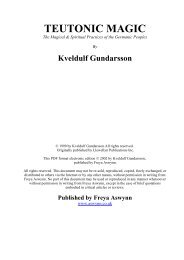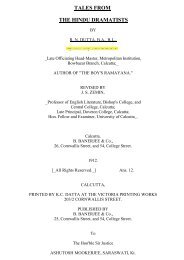Untitled - Awaken Video
Untitled - Awaken Video
Untitled - Awaken Video
Create successful ePaper yourself
Turn your PDF publications into a flip-book with our unique Google optimized e-Paper software.
Chapter 7. At the Well of Urð 171<br />
end. Knowledge or wisdom, on the other hand, is an understanding of the Tree/<br />
Waters complex resulting in right action which eventually allows one to enter into<br />
the flow of power/ luck. Intelligence is of some importance, but the fact is that<br />
there are many of great intelligence who are completely incapable of acting out of<br />
knowledge or wisdom. “Cunning” is not synonymous with “knowledge” or “wisdom.”<br />
“Cunning” is the ability to create proper or improper action based on knowledge.<br />
Often the term is given negative connotations as in “cunning as a fox.” For example,<br />
notice the slight change in tone between a “cunning grin” and a “knowing smile.”<br />
However, etymologically, the word is closely related to the word “to know” and has<br />
a cognate in modern German kennen (“to know”). “Cunning” is used throughout<br />
this text in its neutral form rather than its pejorative. “Cunning” is to “knowledge”<br />
as “intelligence” is to “information.”<br />
In such a worldview as is presented here, there are three ways in which one can<br />
access knowledge:<br />
1. through ritual or ritualized behavior,<br />
2. through divination, and<br />
3. through the practice of seið or Whole-making.<br />
These are very broad categories with much overlap, and they are somewhat arbitrary<br />
having no existence in reality other than the simplifying of the presentation of this<br />
material for this book.<br />
The first category can be defined as “acting to access knowledge.” Knowledge is<br />
the internalized understanding of the Tree/ Waters complex and ritual or ritualized<br />
behavior provides the action so to result in access of power/ luck. By acting in<br />
specific ways, utilizing guidelines such as the Hávamál or the spiritual philosophy<br />
as outlined in the preceding chapters, access to the Flow of the Waters is assuredly<br />
increased.<br />
Occasionally, one might recoil at the thought of engaging in ritualized behavior,<br />
but it is common practice and, at some level, instinctive to all animals including<br />
humans. It has evolved simply because it increases the chances of success. The<br />
animalistic behaviors of “grooming” and “mating ritual” are human behaviors the<br />
world over because they increase the chance of perpetuating human life, they improve<br />
the quality of life, and they feel very pleasant to the human nervous system.<br />
Non-instinctive ritualized behaviors also function to improve one’s lot in life. “Being<br />
polite,” for example, is a social lubricant for easing tension between people, is very<br />
ritualized in nature (always say “please” and “thank you”), and increases the possibility<br />
of success, and increasing possibilities is all one can hope for since there are<br />
no guarantees. So, no matter how one may initially respond to the idea of ritualized<br />
behavior, the fact is that it works more often than not.
















